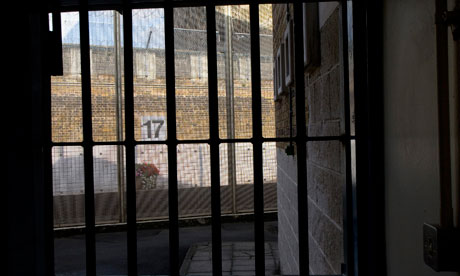Government proposals to restrict voting after EU ruling on prisoner rights challenged by Scottish inmates
 Prisoners say the government's proposals defy a European human rights ruling. Photograph: Antonio Olmos/@Antonio Olmos
Prisoners say the government's proposals defy a European human rights ruling. Photograph: Antonio Olmos/@Antonio OlmosSeverin Carrell, Scotland correspondent, Guardian, Tuesday 1 February 2011 18.25 GMT
Two prison inmates are to accuse David Cameron's government of a flagrant breach of a European court ruling that ordered the UK to give prisoners the right to vote.
The two Scottish inmates, known as Greens and MT, are to complain to the grand chamber of the European court of human rights (ECHR), three months after the court warned the UK government that it faced huge penalties for failing to give prisoners a vote.
The men claim that the government's proposals to restrict the vote to those serving less than 12 months and to deny them the right to vote in Scottish and Welsh elections is "untenable" and a clear breach of the ECHR ruling in November.
Ministers are hardening their position after saying last year that they would allow anyone serving less than four years a vote. Cameron said that the thought of prisoners voting made him "physically ill". Scottish government ministers have opposed the move entirely.
The controversy has escalated after Aidan O'Neill QC, an expert in prisoners' rights, told MPs on the Commons political and constitutional reform committee that ministers were wrong to extend voting rights to the Scottish and Welsh elections.
"There is an urgency about this," O'Neill said. "This is reaching crunch point."
Denying inmates a vote in elections to the Scottish parliament and the Welsh assembly on May 5 would be incompatible with the European convention of human rights. That would again open the UK up to heavy fines and legal attempts to stop the elections.
"There could be a whole new raft of arguments about the legality of those elections and the possibility of compensation claims. In order to avoid that, something has to be done very quickly," O'Neill said.
Cameron has previously confirmed that failing to give prisoners votes could cost the taxpayer £160m in compensation but is coming under intense backbench pressure from across the parties to resist the ECHR ruling.
Jack Straw, the former Labour justice secretary, and David Davis, the former Tory leadership contender, have secured a Commons debate on the controversy next Thursday. Davis said: "I yield to no-one in my defence of human rights, but giving rapists the vote is not human rights."
Tony Kelly, the solicitor acting for Greens and MT, both in Peterhead jail near Aberdeen, said lawyers were drafting a detailed chronology setting out the government's statements and activity after the ECHR ruling.
The UK, he said, is "in flagrant breach of its international obligations. It really is last chance saloon for the government."
Kelly said the UK government had already conceded in a legal hearing before the 2007 Scottish elections that these elections were covered by the human rights convention; that left him nonplussed that ministers now believed they were not.
"It's beyond debate. The last time we litigated on this in the domestic courts, the government came along and conceded the matter," he said.
The ECHR ruling bluntly accused the UK government of repeatedly stalling on implementing previous rulings that gave prisoners voting rights. Because of the rulings, it said 2,500 prisoners were eligible for compensation while potentially 70,000 inmates could have the right to sue.
The UK's failure to act was an "aggravating factor" in every pending case, while the legal and financial implications increased with every missed election. The court said the UK obstruction of the court "represents a threat to the future effectiveness of the convention machinery".
Richard Baker, the Scottish Labour party justice spokesman at Holyrood, said: "It has been the view of successive governments in the UK and countries around the world that those who commit crimes so serious they warrant a period of imprisonment should forfeit the right to vote while they are imprisoned.
"I share the deep concern of the Scottish public at the thought of convicted serial killers, rapists and paedophiles getting the right to vote."
Comment: The sub-heading is inaccurate because it was a ECtHR ruling and not a EU ruling. In the article it claims that Aidan O'Neill QC, said "wrong to extend" when he actually said "wrong not to extend".

No comments:
Post a Comment